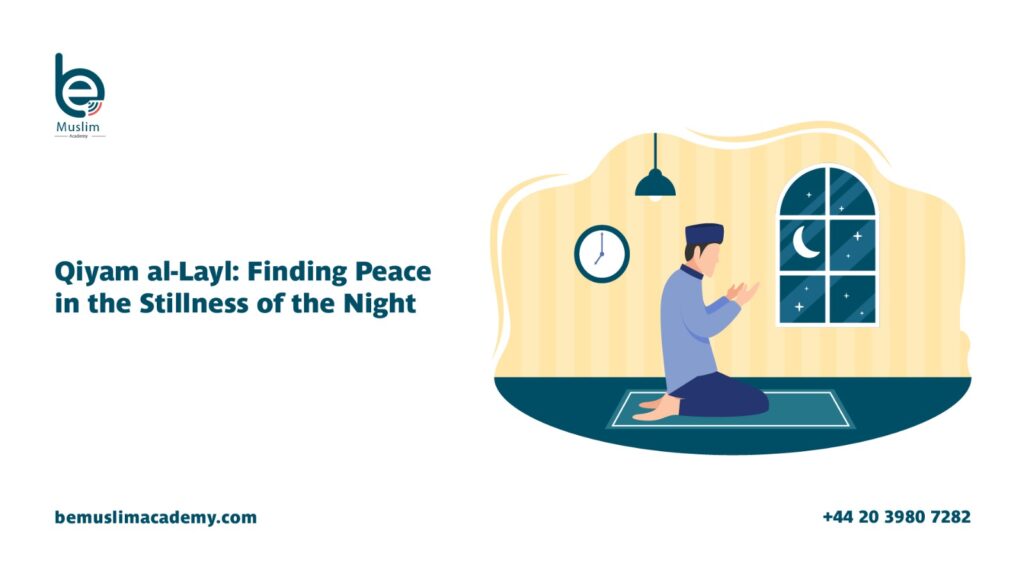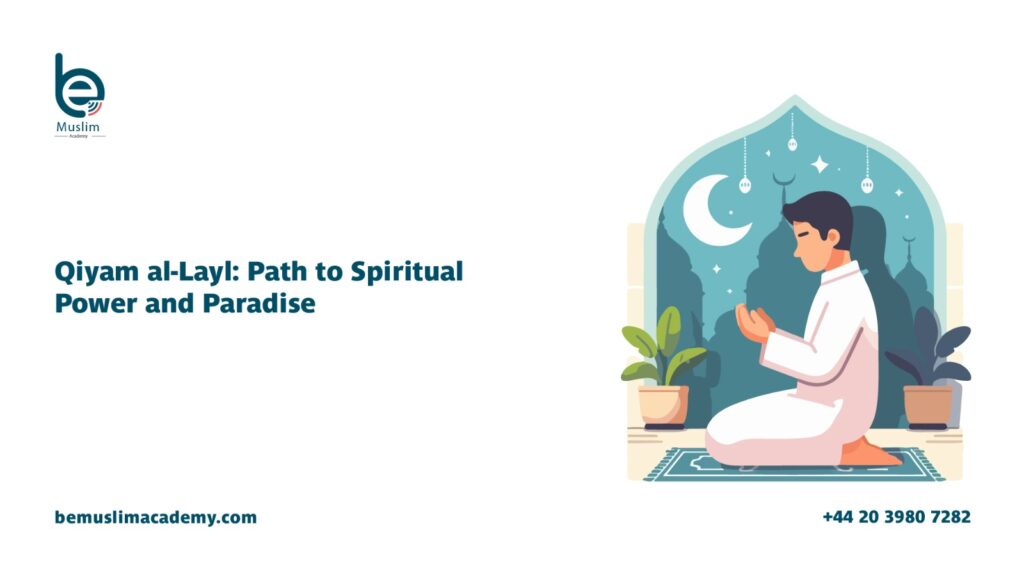Introduction: What Is Qiyam al-Layl?
Qiyam al-Layl, or the Night Prayer, is one of the most spiritually uplifting practices in Islam. It refers to voluntary prayers performed at night, especially during the last third of the night, and it holds a place of high virtue in the Qur’an and Sunnah. Unlike the five obligatory prayers, Qiyam al-Layl is optional but deeply recommended.
In 2025, with the distractions and fast pace of life, Qiyam al-Layl offers Muslim believers an intimate moment of connection with Allah ﷻ. It’s a time for deep reflection, personal supplication, and renewed faith.
1. Qiyam al-Layl Strengthens Your Bond with Allah
One of the greatest benefits of Qiyam al-Layl is the opportunity to draw closer to your Creator in silence and solitude. During these precious hours, you can speak to Allah, cry, repent, and express gratitude.
The Prophet Muhammad ﷺ said:
“The closest that the Lord is to His slave is in the last part of the night, so if you can be among those who remember Allah at that time, then do so.” (Tirmidhi)
This makes Qiyam al-Layl the ideal time to ask for forgiveness, guidance, and blessings.
2. Qiyam al-Layl Purifies the Heart
In a world filled with distractions and emotional stress, Qiyam al-Layl acts as a spiritual detox. It calms the heart and clears the mind. During this quiet time, when others are asleep, the heart becomes more receptive, and the soul is lifted.
The act of waking up for Allah alone, purely out of love and devotion, polishes the soul and strengthens sincerity.
3. Qiyam al-Layl Builds Discipline and Self-Control
Consistency in Qiyam al-Layl builds spiritual discipline. Waking up in the last third of the night when the world sleeps is not easy. But that sacrifice trains your body and mind to be resilient, obedient, and focused.
This discipline extends into other areas of life:
- Time management
- Fajr prayer punctuality
- Healthier sleep habits
- Increased productivity
Regular Qiyam al-Layl trains the believer to overcome laziness and procrastination, cultivating strong willpower and accountability.
4. Qiyam al-Layl Brings Barakah into Your Life
Barakah (blessing) is something every Muslim seeks in their time, wealth, health, and relationships. Qiyam al-Layl is a powerful source of Barakah.
Ibn Taymiyyah said:
“There is something in the night prayer that is not found in any other act of worship.”
Those who regularly perform Qiyam al-Layl often report:
- Success in personal and professional goals
- Peaceful homes and marriages
- Contentment and gratitude
- Emotional strength
Barakah fills the life of the one who turns to Allah during the night.
5. Qiyam al-Layl Is the Sunnah of the Righteous
The Prophet ﷺ and his companions would not miss Qiyam al-Layl. It was a part of their routine. Allah describes the righteous in the Qur’an:
“They used to sleep but little by night, and in the hours before dawn, they would ask forgiveness.” (Surah Adh-Dhariyat 51:17-18)
Following the example of the righteous by performing Qiyam al-Layl helps us stay connected to the early generations of Muslims.
It’s a reminder that we are continuing a noble tradition and striving for the same Jannah (Paradise) they longed for.
6. Qiyam al-Layl Opens the Door to Personal Du’a
One of the most beautiful features of Qiyam al-Layl is the time it offers for personal du‘a (supplication). This is your private meeting with Allah — to ask anything.
The Prophet ﷺ said:
“Our Lord descends every night to the lowest heaven when the last third of the night remains and says: ‘Who will call upon Me, that I may answer him? Who will ask of Me, that I may give him?’” (Bukhari and Muslim)
This sacred window is unlike any other moment in the day. The gates of mercy are wide open, and your heartfelt prayers are welcomed.
7. Qiyam al-Layl Boosts Mental Health and Emotional Stability
Modern science confirms what the Qur’an and Sunnah already teach: prayer helps reduce stress, anxiety, and depression. Qiyam al-Layl is a time of stillness and mindfulness, offering:
- Emotional healing
- Mental clarity
- Deep reflection
It becomes a source of peace in an otherwise chaotic world.
How to Start Praying Qiyam al-Layl
You don’t need to start with a long, exhausting night. The key is consistency and sincerity.
Tips:
- Sleep early to wake up refreshed.
- Set a soft alarm and place it away from your bed.
- Start with 2 rak‘ahs and increase gradually.
- Make sincere du‘a in your own language.
- End with Witr prayer before Fajr.
Even two units of prayer in the middle of the night can bring immense reward and transformation.
What Time Is Best for Qiyam al-Layl?
Qiyam al-Layl can be prayed any time after `Isha and before Fajr. However, the last third of the night is most preferred.
You can calculate this by dividing the time between Maghrib and Fajr into three parts. The last portion is the most sacred.
Who Can Pray Qiyam al-Layl?
Anyone who sincerely wants to draw closer to Allah can perform it:
- Parents and busy workers
- Students preparing for exams
- People going through emotional pain
- Muslims seeking guidance
You don’t need to be perfect to stand before Allah — just sincere.
Conclusion
Qiyam al-Layl is not just a prayer; it’s a gateway to deep spiritual transformation. In this first part, we’ve uncovered its meaning, virtues, and why it holds such a powerful place in the heart of every Muslim striving for closeness to Allah.

Qiyam al-Layl: A Gateway to Divine Love and Forgiveness
Qiyam al-Layl is not just an extra prayer—it’s an expression of deep love and longing for Allah ﷻ. Waking up when the world sleeps and standing in prayer invites an intimate closeness to the Creator.
Allah mentions in the Qur’an:
“Their sides forsake their beds, to invoke their Lord in fear and hope…”
(Surah As-Sajdah 32:16)
This powerful ayah describes those who engage in Qiyam al-Layl as people loved and honored by Allah. Their hearts are filled with sincerity, humility, and a strong desire for Allah’s mercy.
Many scholars say that no worship draws you closer to Allah like praying at night, especially in the last third of the night. It’s a time when the soul is quiet, distractions are minimal, and the heart is open.
Mental Clarity and Emotional Healing Through Qiyam al-Layl
One of the most underappreciated benefits of Qiyam al-Layl is its profound effect on mental and emotional well-being.
1. Qiyam al-Layl Relieves Anxiety
The stillness of the night, combined with heartfelt du’a and focused recitation, soothes anxiety and replaces it with tranquility.
Scientific research also shows that regular, mindful spiritual practices reduce cortisol (the stress hormone), improve emotional resilience, and promote better sleep patterns.
2. Qiyam al-Layl Fights Depression
Qiyam al-Layl instills hope. When you pour your heart out to Allah in sujood (prostration), it creates a sense of being heard, supported, and loved. This emotional release can lighten depression, especially when accompanied by positive affirmations found in Qur’anic verses.
3. Qiyam al-Layl Improves Focus and Self-Control
People who regularly pray Qiyam al-Layl often develop better self-discipline and focus in both their spiritual and worldly lives. Resisting sleep and choosing worship trains the nafs (ego), making you more in control of your time, habits, and decisions.
The Habit of the Righteous
Many of the Sahabah and early righteous scholars (salaf) considered Qiyam al-Layl the true measure of one’s connection to Allah.
Imam Al-Hasan Al-Basri (rahimahullah) once said:
“I never saw anything that nourishes the soul, protects the heart, and brings more benefit in both worlds than Qiyam al-Layl.”
Prophet Muhammad ﷺ regularly performed Qiyam al-Layl, even when he was tired or traveling. It wasn’t an obligation on him—it was a source of strength.
Qiyam al-Layl and Productivity During the Day
It might sound strange, but sacrificing a little sleep at night often results in more energy, clarity, and barakah (blessing) during the day. Many high achievers among Muslims attribute their success to waking up early for Qiyam.
This prayer sharpens your intentions, helps you prioritize your tasks, and keeps your heart anchored in sincerity. When your day starts with Qiyam al-Layl, you carry that light throughout your interactions, work, and family life.
Building a Nightly Routine for Qiyam al-Layl
Creating a sustainable Qiyam al-Layl habit doesn’t mean waking up for two hours every night. Start small, stay consistent, and gradually increase. Here’s how:
1. Sleep Early
To wake up early, you must sleep early. Avoid screens 1 hour before bed. Make wudu and recite evening adhkar before sleeping.
2. Set a Sincere Intention
Even if you don’t wake up, you’re rewarded for your intention. Sincerity matters more than quantity.
3. Start with 2 Rak‘ahs
Begin with just two units (rak‘ahs). Prophet Muhammad ﷺ said:
“The best prayer after the obligatory prayers is Qiyam al-Layl.”
(Muslim)
4. Wake Up Just Before Fajr
Even 15 minutes before Fajr is still Qiyam al-Layl. Use this time to make du’a, ask for forgiveness, and pray Tahajjud.
5. Use a Prayer App or Reminder
Set a gentle alarm and keep your prayer clothes near you. This reduces friction and increases success.
Du‘a is Accepted During Qiyam al-Layl
The most beautiful benefit of Qiyam al-Layl is that it’s the time when Allah ﷻ descends to the lowest heaven and says:
“Is there anyone to ask Me, so I may grant him? Is there anyone to seek My forgiveness, so I may forgive him?”
(Bukhari & Muslim)
This is the most spiritually powerful window of the night. It’s a direct invitation from Allah to talk to Him.
Imagine raising your hands at 3:45 AM, and the One who controls all things is listening to your voice, your pain, your hope. This is Qiyam al-Layl.
Encouraging Your Family to Perform Qiyam al-Layl
Qiyam al-Layl should be a family goal. Teach your kids the beauty of praying at night. Even one rak‘ah makes a difference.
- Let them see you pray
- Wake them gently for 2 rak‘ahs
- Make it a bonding experience with snacks and reflection afterward
When a child is raised seeing their parents perform Qiyam, it becomes natural to them. You’re not only praying—you’re planting the seeds of a spiritual legacy.
Breaking the Excuses
Here are some common excuses and how to overcome them:
| Excuse | Response |
|---|---|
| I’m too tired | Sleep earlier and just start with 2 rak‘ahs |
| I don’t know what to say | Recite short surahs and make heartfelt du‘a |
| I forget to wake up | Use multiple alarms and ask family to help |
| I sin too much | This prayer is your path to repentance and mercy |
Internal Link Suggestions (from your website)
External Link Suggestions

Qiyam al-Layl Brings Light in This Life and the Next
Qiyam al-Layl is not only spiritually fulfilling—it transforms your entire life. The benefits of this blessed prayer go beyond the night. It brings light to your heart, clarity to your mind, and guidance to your path. It’s a source of barakah (blessing) in your time, relationships, studies, and income.
In the Qur’an, Allah says:
“Indeed, the hours of the night are more effective for concurrence [of heart and tongue] and more suitable for words.”
(Surah Al-Muzzammil 73:6)
Praying at night brings a unique light to the face, as many righteous predecessors reported. People who consistently perform Qiyam al-Layl often have a special calmness and spiritual presence.
Reward in the Akhirah (Hereafter)
The Prophet ﷺ said:
“In Paradise, there are chambers whose outside can be seen from the inside, and the inside from the outside… for those who speak well, feed others, fast regularly, and pray at night when people are asleep.”
(Tirmidhi)
This hadith shows us how Qiyam al-Layl elevates a believer’s rank in Paradise. These are not ordinary rooms—these are special chambers reserved for those who rise in the night to worship.
Qiyam al-Layl Protects You from Sins
When you develop the habit of Qiyam al-Layl, your spiritual consciousness increases. It becomes harder to sin during the day after connecting with Allah at night.
Night prayer serves as a shield—it reminds you of your accountability and strengthens your willpower against temptations.
The Prophet ﷺ said:
“Hold fast to night prayer, for it is the practice of the righteous before you, a means of nearness to your Lord, and a barrier from sin.”
(Al-Hakim)
This is one of the most important life-changing truths about Qiyam al-Layl. It doesn’t just make you spiritual—it makes you stronger, cleaner, and more aware.
Qiyam al-Layl Helps You Achieve Your Goals
One of the most overlooked benefits of Qiyam al-Layl is how it opens doors of success. Many righteous people, scholars, and even successful business professionals testify that when they started praying Qiyam consistently, things began to change for the better.
Whether you’re praying for marriage, healing, guidance, or career success—Qiyam al-Layl is the time to ask. Allah’s doors are wide open.
Du‘a made during this time is powerful and often answered. You’ll see that your goals become more aligned with goodness, and your hardships become lighter.
Teaching Children the Value of Qiyam al-Layl
Helping kids develop a love for Qiyam al-Layl doesn’t mean making them pray long hours at night. It starts with small steps—watching parents pray, hearing stories about the Prophet ﷺ waking at night, and being gently invited to join.
Ideas for teaching children:
- Create a Qiyam chart for Ramadan
- Share bedtime stories about the Sahabah and Qiyam
- Let them see you make du‘a after night prayers
- Encourage one rak‘ah with sincere du‘a
When children see the joy and peace it brings, they’ll associate Qiyam al-Layl with love, not hardship.
Common Myths About Qiyam al-Layl
Let’s clear up some common misconceptions that stop people from praying Qiyam al-Layl:
| Myth | Truth |
|---|---|
| Only scholars or imams can pray Qiyam | Every Muslim is invited to this special prayer |
| You must pray a long time | Even 2 rak‘ahs before Fajr count as Qiyam al-Layl |
| It’s only for Ramadan | Qiyam al-Layl is beneficial all year long |
| I can’t memorize long surahs | Recite short surahs or read from the Mushaf |
Breaking these myths will make it easier for Muslims—especially new reverts and youth—to embrace this practice without fear.
Qiyam al-Layl and Ramadan
Qiyam al-Layl reaches its peak during Ramadan. In the last ten nights, the entire Muslim world comes together in prayer, seeking Laylat al-Qadr.
But imagine having this connection outside of Ramadan. If you already have the habit, Ramadan becomes even more special. You’re spiritually fit, prepared, and deeply connected to Allah.
You don’t have to start big. Consistency matters more than intensity.
Final Reflections: Why Every Muslim Must Know the Power of Qiyam al-Layl
We live in a fast-paced world where distractions and worries steal our peace. Qiyam al-Layl is your secret weapon—a way to recharge your soul, connect with your Creator, and rise above worldly struggles.
Here’s what Qiyam al-Layl gives you:
- Direct connection with Allah
- A clear and focused heart
- Peaceful sleep and mental strength
- Forgiveness and divine love
- Reward beyond imagination in Jannah
It’s time to reclaim your nights. Whether you’re a teen navigating modern challenges, a parent overwhelmed by responsibilities, or a new Muslim trying to find your way—Qiyam al-Layl is your light in the darkness.
Call to Action
🌙 Don’t wait until Ramadan.
🌙 Set your alarm 15 minutes before Fajr.
🌙 Pray just 2 rak‘ahs and make sincere du‘a.
Start your journey of Qiyam al-Layl tonight — and watch how it transforms your faith, your family, and your future.







